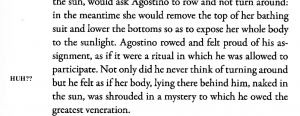We did it. We did it, everyone. We made it to the end of the semester and this will be the last blog post for the course. Applaud yourselves on the back for all the readings you have done, blog posts you wrote, as well as all of the discussions you went through. Most importantly, a huge applause to the TAs and our professor for the course, Dr. Jon Beasley-Murray. I’m surprised how quick the semester flew by and that I somehow managed to get myself writing a weekly blog post and commenting on classmates’ posts. I signed up for this course as part of my literature requirement, but I had initially thought this course was all about reading romantic books originating from different languages, but it turns out, it is much more.
Now, reflecting back to all the readings we have done throughout the semester, I noticed common remerging themes. Aside from the discussions of books being gendered, characters having asshole husbands or boyfriends, sexism, politics (including war), and coming of age, were the most prominent recurring themes with all the books we have read. I liked how we explore books from a range of centuries and read the translations from various languages. In addition, we read books with varying levels of difficulty, which I believe encourages us to think about and engage with the material, even if we did not particularly indulge with the book itself. For example, The Hour of the Star by Lispector, was a more challenging book to read because of the confusion between narrators and characters, but also it being a challenge makes you want to understand why it was difficult or confusing? However, this is not to say that the books where it was more tedious to follow, for example, Combray, were enjoyable. In fact, I did not really enjoy reading it because quite frankly, the style was just not my cup of tea.
The range of books we have read in the class also had authors not just from varying cultural backgrounds and eras, but also distinctive styles of writing. I found how the style of writing can also be metaphorical in the way it can be connected to the storytelling. For example, Death without Interruptions, had many long sentences without a period in sight. When you think deeply about what a period does, you can also think about how the function of a period indicates the end of the sentence, and think through how that could be representative of the citizens being immortal in the book.
Overall, this course has really allowed me to see the varying styles of writing, interpretations, as well as how we can collectively think about the translations in writing. I am proud that I have made it through completing the contract (after some revisions and breaking it one time, but this was way before the deadline to revise the contract). I think that with this course and semester coming to an end, I can only think more about selecting more books that are outside of my preferred genres of non-fictions or simple romantic fiction. This course has been well organized and it has been overall fun to write blog posts. I truly enjoyed hearing some of the engaging discussions along with reading some of the posts because quite frankly, some of you had the most creative, honest, and humorous titles.
